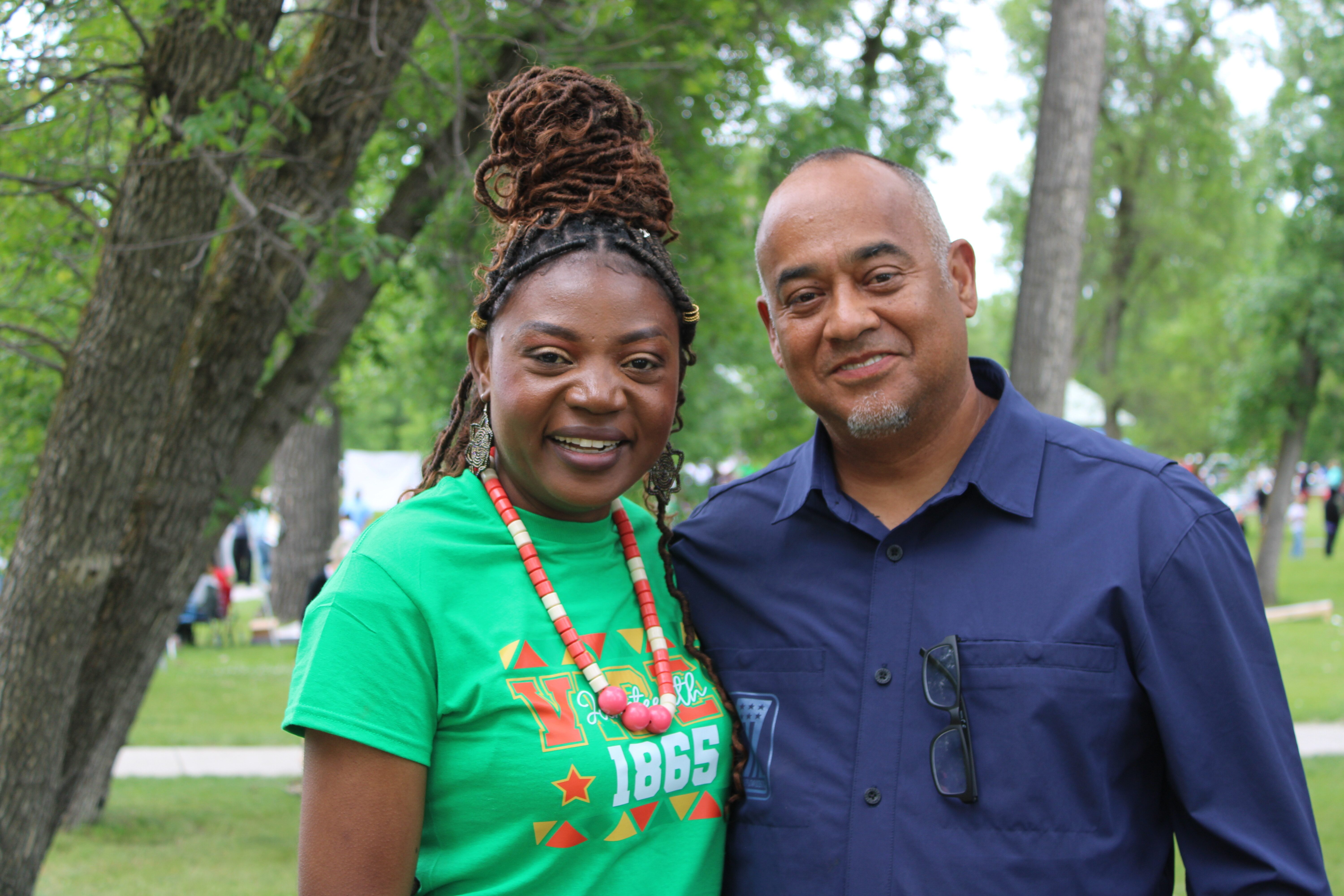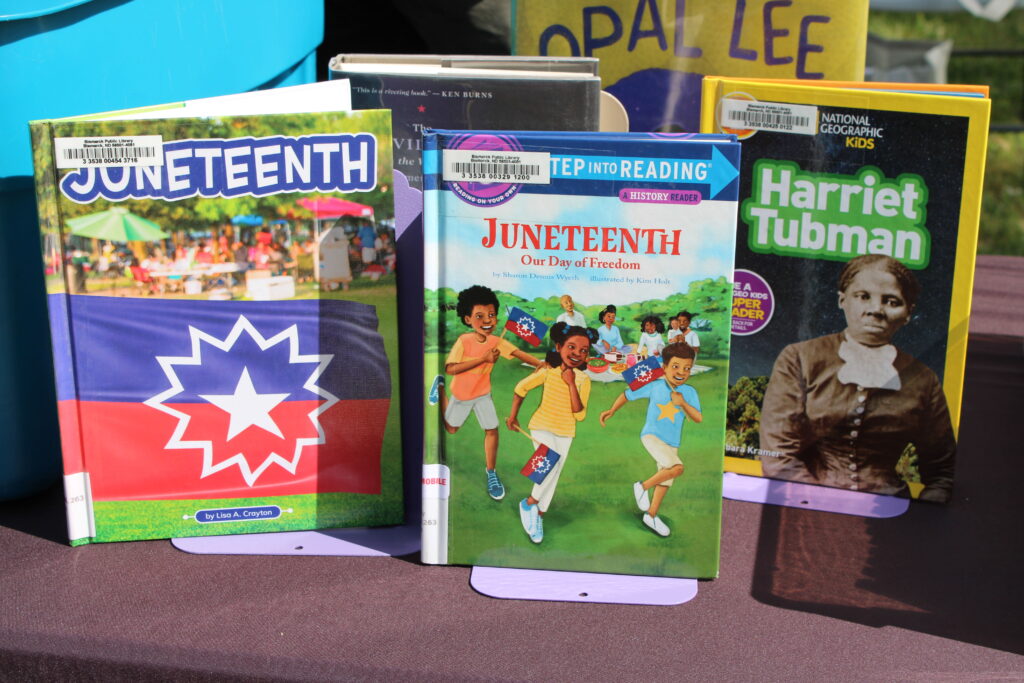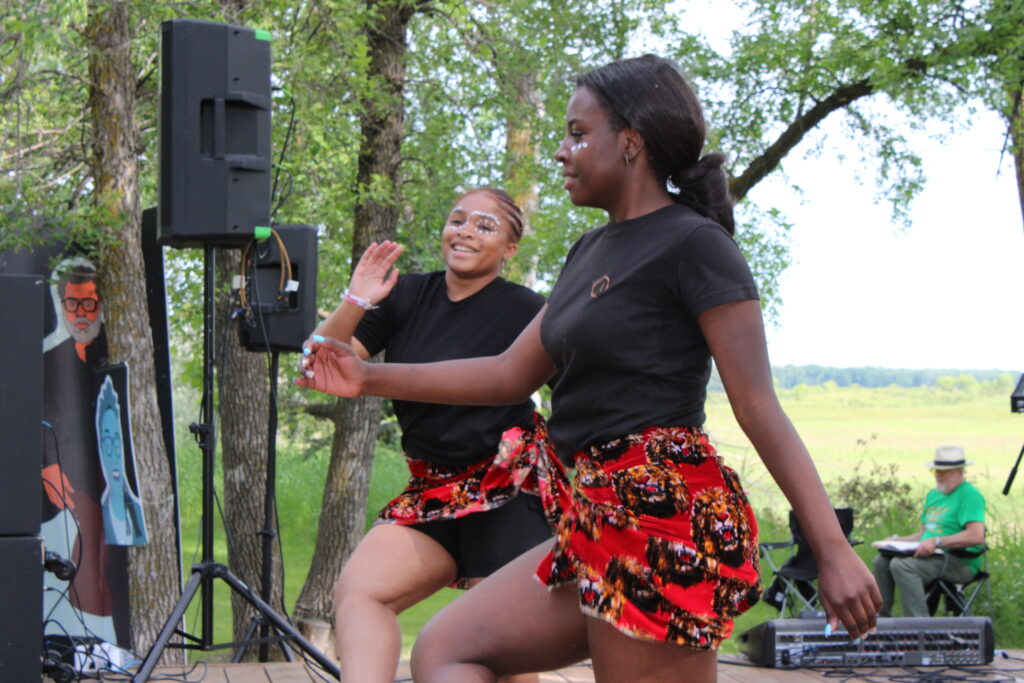Inspired by her grandparents, Tonah Fishinghawk-Chavez proves that caring for the community is an action, not just a word

Geraldine Ambe, one of the organizers, led children in a dance onstage at Bismarck’s second Juneteenth celebration on June 19. (Photo credit/Alicia Hegland-Thorpe)
Working for human liberation is a demanding calling that requires mutual support, spoken word artist Frederick Edward Jr. told a captivated audience during the second Juneteenth celebration at General Sibley Park and Campground in Bismarck.
“So when you’re singing in choir and then you lose your breath, the next person already starts before you lose your breath, and what it shows you is that you don’t miss out on the song,” said Edward. “The song continues, and that’s just like liberation work. We have to continue when people get tired… whether it’s talking about just liberating ourselves from our mental shackles or we talk about social justice issues that are happening, you need to have people on your team so when you are tired and you can no longer sing, they can continue the song for you.”

That song rang out loud and clear in Sibley Park on June 19. Speakers and artists alike acknowledged that while Juneteenth is a joyous holiday, it marks the end of a dark era of America’s history. Two and a half years after President Abraham Lincoln issued the Emancipation Proclamation, the last 250,000 enslaved people in the United States were finally liberated on June 19, 1965. Now a national holiday, Juneteenth continues to be celebrated across the country.
“When we think about Juneteenth, we think about this day in Galveston, Texas, where the Army actually showed up and showed people, you’re actually free, and you’ve been free for two years,” said Joseph McNeil, Jr., who led the opening of the event. “But the slave owners down there didn’t want to let anybody know, [so they] just kept working. So for two years, folks in Texas had no idea they were free.”
“Just bringing history and culture to North Dakota –– that’s not something that we see a lot in Bismarck. Having people of color just show up and celebrate the history, the past is important.”
Massa Poure- Bismarck Juneteenth organizer

McNeil, a citizen of the Standing Rock Sioux Tribe, shared a bit with the audience about how he came to represent both his Black and Indigenous roots. On his mother’s side he is Lakota/Dakota and on his father’s side he is Black. His father, Joseph McNeil, Sr., is one of The Greensboro Four, a group of friends who made history by sitting at a segregated lunch counter in a North Carolina Woolworth’s on Feb. 1, 1960.
The four friends’ act of resistance led to a whole wave of sit-ins that spread throughout the South, raising awareness about the injustices of segregation and the legacy of slavery.
Spoken word poet Konria Wayne, DJ Jwett Jwett, and the Royal Band were among the artists who performed throughout the celebration. Local organizations and community members, including Bismarck Mayor Mike Schmitz and Sacred Pipe Resource Center, also came out to speak at the event.
Tiffani Alston, one of the speakers, discussed how the holiday addresses different emotions –– ranging from sadness, to joy and pride. “Juneteenth is an opportunity to face our nation’s history, not to deny it,” said Alston. “Juneteenth is an acknowledgment of the sacrifices made by our ancestors. Juneteenth is a hope-filled moment that led to increased opportunities for people of color.

“Juneteenth is a celebration of our people’s achievements. Juneteenth is an occasion to promote cultural awareness and encourage self-development. Juneteenth is a time to bring attention to the struggles toward equality faced by African Americans then and now. And Juneteenth is also a reminder of the work that still needs to be done to break down the walls of racism.”
Massa Poure, one of the organizers, has managed the event’s Facebook page for the last three months. In addition to her social media work, she’s been reaching out to organizations for collaboration and partnership. Poure, who came to Bismarck from Liberia nine years ago, wanted to help plan a Juneteenth celebration after learning about the holiday’s history. Despite the dire circumstances, she found it important to acknowledge what is often known as the United State’s second Independence Day.
“You need to have people on your team so when you are tired and you can no longer sing, they can continue the song for you.”
Frederick Edward Jr.- spoken word artist
“The fact that our ancestors fought for us and today we have that freedom is a good thing to celebrate because then we can look back and remember those that sacrificed their lives for us,” Poure said.
Last year, around 250 people showed up to the inaugural Juneteenth celebration at Kiwanis Park. This year a comparable crowd turned out for the event at General Sibley Park in South Bismarck, a new venue chosen for space and parking concerns. Poure said she is glad this event is bringing awareness about the holiday to the local community. While some states recognize Juneteenth as an official public holiday, North Dakota doesn’t.
“A lot of other cities were celebrating Juneteenth because it was officially a federal holiday that was passed in Texas,” said Poure. “Other states followed suit, but in Bismarck, even though it’s still a federal holiday, it’s not a local holiday. That was part of the reason why we decided to start to push for this.”
In the future, Poure hopes the Bismarck Juneteenth celebration continues to bring the community together. “Just bringing history and culture to North Dakota –– that’s not something that we see a lot in Bismarck,” said Poure. “Having people of color just show up and celebrate the history, the past is important.”
Bismarck Juneteenth-Click images to enlarge
Adrianna Adame
Former Indigenous Democracy Reporter
Location: Bismarck, North Dakota
See the journalist pageSchaeffer, K. (2023, June 9). More than half of states will recognize Juneteenth as an official public holiday in 2023. Pew Research Center. https://www.pewresearch.org/short-reads/2023/06/09/more-than-half-of-states-now-recognize-juneteenth-as-an-official-holiday/
© Buffalo's Fire. All rights reserved.
This article is not included in our Story Share & Care selection.The content may only be reproduced with permission from the Indigenous Media Freedom Alliance. Please see our content sharing guidelines.
The billboard project is expanding to Oregon
Identification not yet made
Dramatic play reveals power of Indigenous stories and community
Thousands peacefully protest
UTTC International Powwow attendees share their rules for a fun and considerate event







